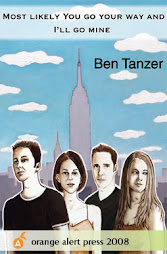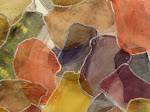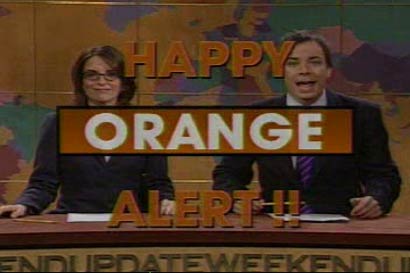 Andrew Madigan
Andrew MadiganIn order to write you have to experience, you have to travel, you have to move outside the structure of your life. Well, perhaps you don't have to, but through experiences and challenging situations the writer can easily find things to draw upon. A story and situation that I always find compelling is the American that finds himself in a new land and is forced to learn a new culture. The first story I had read by Brooklyn's Andrew Madigan was called "Buying Beer in Cairo", and it was a graphic account of his first day in Cairo. I really enjoyed it, and came to find out the Andrew was living with his family in a Hilton Hotel in Al Ain of the United Arab Emirates. I was fascinated by the possibilities of the situations and decided to ask Andrew a few questions.
Orange Alert (OA): You left Brooklyn to travel to Dubai to teach, and that is a life altering decision. What factors did you way in making that move?
Andrew Madigan (AM): I actually lived in Dubai from 2000-04; now I’m in Al Ain, about an hour away from Dubai. My wife, 2 daughters and I like to travel. Moving is an adventure game for us. We were about to settle down, after living in South Korea, Tokyo, Okinawa, Dubai and other places, but the thought of sinking every dollar we had into a grotesquely expensive NY home gave us pause, as did working the same job for years on end. The kids’ school was also quite bad. My new job pays for private education and housing. Now my kids are learning French and Arabic at an international school, instead of watching videos in the American public system. Of course, a housing crisis hit Al Ain, so we’re living at the Hilton Hotel until our home is ready, so things are not well on that front. But at least we don’t have a mortgage. Or a foreclosure. There’ also something about living abroad that makes every day a little bit more intriguing. You’re a foreigner in a strange place and the language is different and everything is just a little bit off. That’s got to be good for writing, if not for the soul. Though of course, my soul is irredeemable.
OA: How has living in Dubai impacted your writing (i.e. settings, plot, etc.)?
AM: I had stopped writing before moving to Dubai, but once I moved I had so much to write about I couldn’t put down the metaphorical pencil. Metaphorical because I use a quill pen and write with my toes. There’s so much stimuli when you move, especially if you move far away. The setting and characters are obviously new, but you also hear different types of stories, which can influence plot. I wrote a novel. Khawla’s Wall, based on what an American woman, who’d married and divorced an Emirati man, told me at work; we were waiting for a student to show up. I have no idea why we were in a room talking, waiting for a student to show up, but I do remember the woman’s story.
OA: I saw somewhere that you are shopping a novel. What can you tell us your novel?
AM: Khawla’s Wall is about all the dramatic changes in the Emirates. The socio-economic climate has changed so much that the country’s traditional values and beliefs are being vigorously challenged. Many would say they’re being destroyed. 40 years ago, the people of Dubai were living in barasti huts made of palm fronds; most of them had no electricity or running water. Now they live in the future, 100 years beyond Tokyo, with 7-star hotels and film festivals and loads and loads of money. Clearly, that comes at a price. My students aren’t allowed to be alone with men or boys not related to them by blood or marriage; they walked around cloaked from head to toe in black silk. But they carry around laptops and cell phones, so they’re not entirely cloistered.
I just wish the literal climate would change: it’s bloody hot here.
Wow, my summary sounds boring. It’s also a love story with mystery and intrigue and involves a local woman in a government office who must work inside a black tower. It contains multitudes.
Gretchen Stelter of Baker’s Mark is representing me. She’s also shopping my second book, Hollywood, South Korea, a serio-comic novel about an American professor teaching on US military bases in South Korea.
OA: You have been published both in print and on-line. Is one more legitimate then the other?
AM: I’ve also taught for both online and onground universities. The answer is the same. There is total crap in the three-dimensional world of print. Paper doesn’t make bad writing good, and electronic mediation doesn’t somehow alchemically compromise the intrinsic quality of good writing. The perception of online publications may be different, though this has changed quite a bit over the last few years. In any case, people tend to perceive things wrong so perception isn’t something that interests me. I’ve been very proud of some of my online publications, but I’ve also raised my eyebrows at the quality of some of the print journals I’ve been in.
OA: Do you find it easier to get published now that you have left New York?
AM: No. However, a few times, I submitted material with Arabic subject matter under Arabic pseudonyms. This material was absolutely published more easily. I attribute this to the reductive, superficial, oddly-biased whims of so many editors and journal referees. As an example, I once published something in a British online journal under the name of an Arabic woman. There was a chat area devoted to the story. Sentences like, “Only an Arabic woman could have told this story” were legion. Previously, the story had been rejected by a journal because “the voice wasn’t authentically Arabic/female.” Indeed! There’s a whole seamy and quite fallacious underbelly of literary analysis that thinks a woman has secret access to every thought of every other woman and a man cannot ever plumb the depths of the female psyche. The same is assumed for race, ethnicity, religion, etc. The truth is that we are all completely separate entities, each human being. No one, man or woman, knows what it is to be me. It’s impossible to see into another person’s mind. Therefore, it’s ridiculous—and, ironically, prejudicial—to assume that it’s any more impossible to see into another person’s mind if that person is from a different race, class, gender, etc. When we worry about trifling, parochial issues like this, we’re wasting our time and keeping our energies away from the real subject—quality. Who cares what gender the author is?
OA: What's next for Andrew Madigan?
AM: I’m writing a novel about a man who moves to Al Ain to teach for a local university and has to live at the Hilton Hotel. I obviously have little imagination.
I also play rugby for the Al Ain Amblers. So I plan to get hurt a lot, perhaps a nice debilitating but not life-threatening injury. Furthermore, I’m looking for another job in Al Ain—anyone interested?—because the people at my present place of employment can’t find me a place to live. I want a home for my children. Americans are so self-absorbed and demanding that way.
Bonus Questions:
OA: Coffee? If yes, where can you find the best cup in your area?
AM: I like these bonus questions even better. Keep ‘em coming. There aren’t many good things about my new job, but coffee is one of them. The university has a woman, the lovely Linda at the end of the corridor where I’m typing this email, to bring coffee and tea. She makes an outstanding Turkish coffee (no sugar). The traditional Bedu way to make coffee is to pound fresh cardamom into a powder and mix it with coffee (and sometimes ginger) in a big samovar. Of course, a Starbucks grande latte has replaced all that: see question 3. Nescafe—sadly, so sadly—is very popular here, as it is in many parts of the world. That’s what really keeps different cultures apart. We need a coffee ambassador to explain the evils of Nescafe, rather than of non-democratic government, to the developing world.
OA: What type of music do you enjoy and who are a few of your favorite's?
AM: If you need a special music correspondent for the website, all you have to do is ask.
I like: Italian opera, especially Giordano; jazz, primarily 40s-60s, especially Miles, Coltrane, Coleman, Rollins and Chet Baker; some crooners and jazz singers; some blues and reggae; country (Cash, Kris K., Willie, Hank, Patsy, George Jones, Bobby Bare); alternative country and Americana (Handsome Family, Ryan Adams, Bobby Bare, Jr., Waco Brothers, Old 97s); classic rock (Beach Boys, Kinks, Who, Stones, Dylan); singer-song-writers (Cohen, Waits, Lucinda Williams, Jesse Malin); and various shades of indie (I Am Kloot, Band of Horses, Destroyer, New Pornographers, Okkervill River); and just plain misc. (Replacements, Lemonheads, Clash, X, Buzzcocks, Thrills, Iggy, Bowie, Neko Case, Palace, Wilco, Beck, Syd Barret, Lambchop, Smog) . I’m getting tired of typing.
+by+Nick+Volkert).jpg)





















1 comment:
Hello matee nice blog
Post a Comment